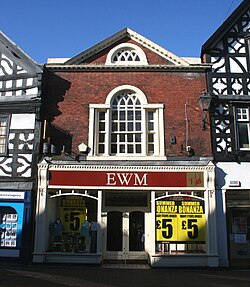20 High Street is a grade-II-listed Georgian building in Nantwich, Cheshire, England, which dates from the late 18th century.[1] It stands on the west side of the High Street (at SJ6505352367). In the 18th century, the building was used as an inn and a venue for cock-fighting; it later became a private house and subsequently a shop. The site is believed to have been near the town's Norman castle.
| 20 High Street | |
|---|---|
 20 High Street in 2007 | |
| Location | Nantwich, Cheshire East |
| Coordinates | 53°04′03″N 2°31′23″W / 53.0674°N 2.5230°W |
| Built | Late 18th century |
Listed Building – Grade II | |
| Designated | 1 March 1974 |
| Reference no. | 1206148[1] |
The town contains many other Georgian listed buildings, most of which were built as town houses; good examples include 9 Mill Street, Dysart Buildings on Monks Lane, and Townwell House and number 83 on Welsh Row. Number 20 is one of the few examples on the High Street, which is known for its many Elizabethan timber-framed buildings, including Regent and Warwick House and the grade-I-listed Crown Inn, which both stand near number 20.[2]
History
editThe present building is thought to stand near the site of the Norman Nantwich Castle.[3] Built before 1180, the castle is believed to have been located on slightly elevated ground between the River Weaver and the modern High Street and Castle Street, probably in the vicinity of number 20 and the Crown Inn.[3][4] The castle was last recorded in 1462.[5]
The existing building dates from the late 18th century.[1][2] It was formerly the Griffin Inn, which was the town's cock-fighting venue in the 18th century.[6][7][8] In the late 19th century the building was a private residence.[7] In the early 20th century it was Densem's, a men's outfitter's.[6][9] It has been a branch of The Edinburgh Woollen Mill since at least 2000.[1][10]
Description
editIn red brick with stone dressings, the building has two storeys with an attic. The single shallow gable is finished as a pediment and has a stone cornice decorated with modillions. The prominent Venetian window on the first floor has narrow flanking pilasters, and there is also a lunette (semicircular) window to the pediment; both windows have stone surrounds.[1][2] The ground floor has a modern shop front.[1]
See also
editReferences
edit- ^ a b c d e f Historic England. "20 High Street, Nantwich (Grade II) (1206148)". National Heritage List for England. Retrieved 8 February 2023.
- ^ a b c Pevsner & Hubbard, pp. 287–88
- ^ a b McNeil Sale R. et al., pp. 12–14
- ^ Garton, 1972, p. 8
- ^ Lake, p. 92
- ^ a b Whatley, plate 27
- ^ a b Hall, p. 218
- ^ Garton, 1978, p. 19
- ^ Kelly's Directory (1914; 1939)
- ^ "Store Details", Company website, The Edinburgh Woollen Mill, retrieved 27 August 2010
Sources
- Garton E. Nantwich, Saxon to Puritan: A History of the Hundred of Nantwich, c 1050 to c 1642 (Johnson & Son Nantwich; 1972) (ISBN 0-9502738-0-5)
- Garton E. Nantwich in the 18th Century: A Study of 18th Century Life and Affairs (Cheshire County Council; 1978)
- Hall J. A History of the Town and Parish of Nantwich, or Wich Malbank, in the County Palatine of Chester (2nd edn) (E. J. Morten; 1972) (ISBN 0-901598-24-0)
- Lake J. The Great Fire of Nantwich (Shiva Publishing; 1983) (ISBN 0-906812-57-7)
- McNeil Sale R. et al. Archaeology in Nantwich: Crown Car Park Excavations (Bemrose Press; 1978)
- Pevsner N, Hubbard E. The Buildings of England: Cheshire (Penguin Books; 1971) (ISBN 0-14-071042-6)
- Whatley A. Nantwich in Old Picture Postcards: 1880–1930 (European Library; 1992) (ISBN 90-288-5380-4)
